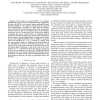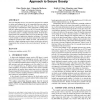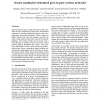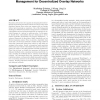PDCAT
2009
Springer
14 years 6 months ago
2009
Springer
Abstract—Awerbuch and Scheideler have shown that peerto-peer overlays networks can survive Byzantine attacks only if malicious nodes are not able to predict what will be the topo...
INFOCOM
2009
IEEE
14 years 7 months ago
2009
IEEE
—The performance of randomized network coding can suffer significantly when malicious nodes corrupt the content of the exchanged blocks. Previous work have introduced error corr...
INFOCOM
2009
IEEE
14 years 7 months ago
2009
IEEE
—In this paper, we present DHTBL, an anti-spam blacklist built upon a novel secure distributed hash table (DHT). We show how DHTBL can be used to replace existing DNS-based black...
SAC
2009
ACM
14 years 7 months ago
2009
ACM
The Peer Sampling Service (PSS) has been proposed as a method to initiate and maintain the set of connections between nodes in unstructured peer to peer (P2P) networks. The PSS us...
PERCOM
2007
ACM
14 years 12 months ago
2007
ACM
Mobile ad hoc networks show great potential in emergency response and/or recovery. Such mission-critical applications demand security service be "anywhere", "anytim...
OSDI
2002
ACM
15 years 18 days ago
2002
ACM
Structured peer-to-peer overlay networks provide a substrate for the construction of large-scale, decentralized applications, including distributed storage, group communication, a...
WWW
2005
ACM
15 years 1 months ago
2005
ACM
Reputation systems have been popular in estimating the trustworthiness and predicting the future behavior of nodes in a large-scale distributed system where nodes may transact wit...




